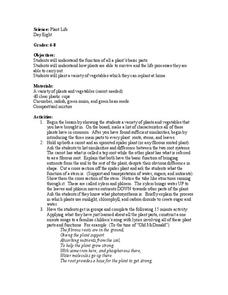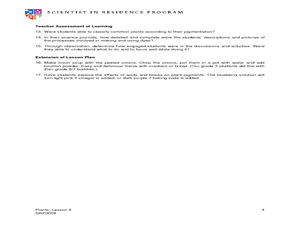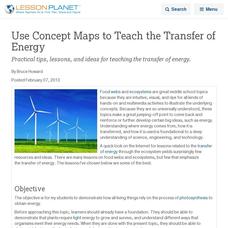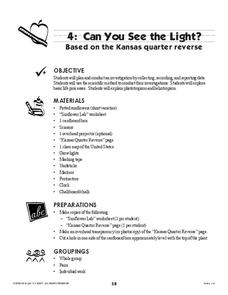Curated OER
Plant Life
Learners study plant parts and their functions. In this plant life lesson students participate in an activity of planting plants.
Curated OER
Eat Your Plants
Students explore fruits and vegetables. In this fruits and vegetables lesson plan, students work in small groups investigating plant parts. Students discover that fruits and vegetables originate from different parts of plants.
Scholastic
Study Jams! Plant Cells
Eight fine-quality slides depict the cells that make up plants. Viewers will see colorful microscope views of the nucleus, cell wall, vacuole, chloroplasts, tracheids, and pollen grains. The resource would apply in either a cell...
Shelby County Schools
How Ecosystems Work
How does one organism get its energy? What is the main source of energy in an ecosystem? How does the flow of energy affect different types of ecosystems? Answer these questions with a fill-in-the-blank worksheet.
Curated OER
Leaves and Photosynthesis
In this science instructional activity, students read detailed information about green plants and the photosynthesis process. In this fill in the blank and true and false instructional activity, students answer twelve questions.
Curated OER
Planting
Fifth graders study the parts of a plant and how they live and grow. For this plant growth lesson plan, 5th graders investigate the processes that plants go through to produce oxygen and release moisture. Diagrams, images, and background...
Curated OER
Mutualism and Co-evolution A study of Flowering Plants and their Pollinators: Biology, Plants
These lessons use a variety of methods and approaches to teach flowering plant biology which includes seed germination; plant growth and food production through photosynthesis; plant transpiration and respiration; sexual reproduction...
Curated OER
Studying Photosynthesis
In this photosynthesis worksheet, students conduct an experiment to show the making of starch in a plant's leaves during photosynthesis. Students complete 2 short answer questions.
Curated OER
A Walk in the Forest
Students explore interrelationships among plants and animals. Students listen to Where to, Little Wombat? by Charles Fuge, and contribute words and phrases for a classroom animal and plant survival chart. Students take a walk in a...
Curated OER
Plant Classfications
Seventh graders observe and discuss as a class the different types of vascular plants. They examine the different parts of the plant and some of the processes occurring in plants with activities accompanying.
Curated OER
Photosynthesis: An enlightening experience
Students observe the effect of light on plants. They illustrate the exchange of gases between the atmosphere and the plant. Students see that plants are part of many natural cycles. They investigate how green plants use the sun's energy...
Curated OER
Mussel Your Way Through Photosynthesis
Students, using zebra mussels (Dreissena polymorpha), elodea and an indicator dye, observe and record the role of light in photosynthesis. They consider plant production of carbon dioxide and the use of live materials in biological...
Curated OER
A Demonstration of Photosynthesis and Transpiration
First graders examine the effect that light and air has on green plants.
Curated OER
Plants and Oxygen: Breathing
Second graders gain an understanding of how plants produce oxygen and that the oxygen we breathe comes from trees and plants. After a lecture/demo, 2nd graders discuss the ways plants produce oxygen and the detrimental effects of cutting...
Curated OER
It's Okay to Exhale: Photosynthesis and Cellular Respiration
Students will observe the differences between photosynthesis and cellular respiration. Then they observe the links due to climate changes and relate how climate change affects their lives.
Curated OER
Plant Life
Seventh graders examine different categories of plant life and their roles as producers of food and oxygen for other organisms. They study the evolution of plants from simple organisms to very complex ones. They look at the different...
Curated OER
Plants: Form and Function
In this plants worksheet, students compare and contrast vascular and non-vascular plants. Students learn the structure and function of the 3 types of plant tissues: dermal, ground, and vascular tissue. This worksheet has 27 fill in the...
Curated OER
Using Plant Pigments as Natural Dyes
Young scholars create friendship bracelets and quilt squares. In this plant lesson plan student dye their own string and cotton material with plant pigments. Students use the naturally dyed materials to create the friendship bracelets...
Curated OER
Plant and Animal Cells - Are they Different?
High schoolers observe the similarities and differences between plant and animal cells. In this cell activity, students use microscopes to observe self prepared slides of animal and plant cells.
Curated OER
Use Concept Maps to Teach the Transfer of Energy
Practical tips, lessons, and ideas for teaching the transfer of energy.
Curated OER
Wetland Metaphors
Young scholars describe the characteristics of wetlands and identify their ecological functions. They inspect items and use them to create metaphors about wetlands.
Ask a Biologist
It’s a Plankton Eat Plankton World
For as small as they are, plankton sure play an enormous role in maintaining marine ecosystems. Dive into an investigation of these tiny organisms with a hands-on life science activity in which children cut out pictures of sea...
National Institute of Open Schooling
Coordination Compounds
Cyanide, a coordination compound, is used in the extraction of gold and silver. Part 24 in the series of 36 delves into the world of coordination compounds. Classes learn, through readings, discussions, and answering questions, how to...
Curated OER
Can You See the Light?
Explore plants and flowers with this lesson. Learners talk about plants, conduct an experiment with suflowers, and track a plants growth. This is a motivating way to present this concept.

























